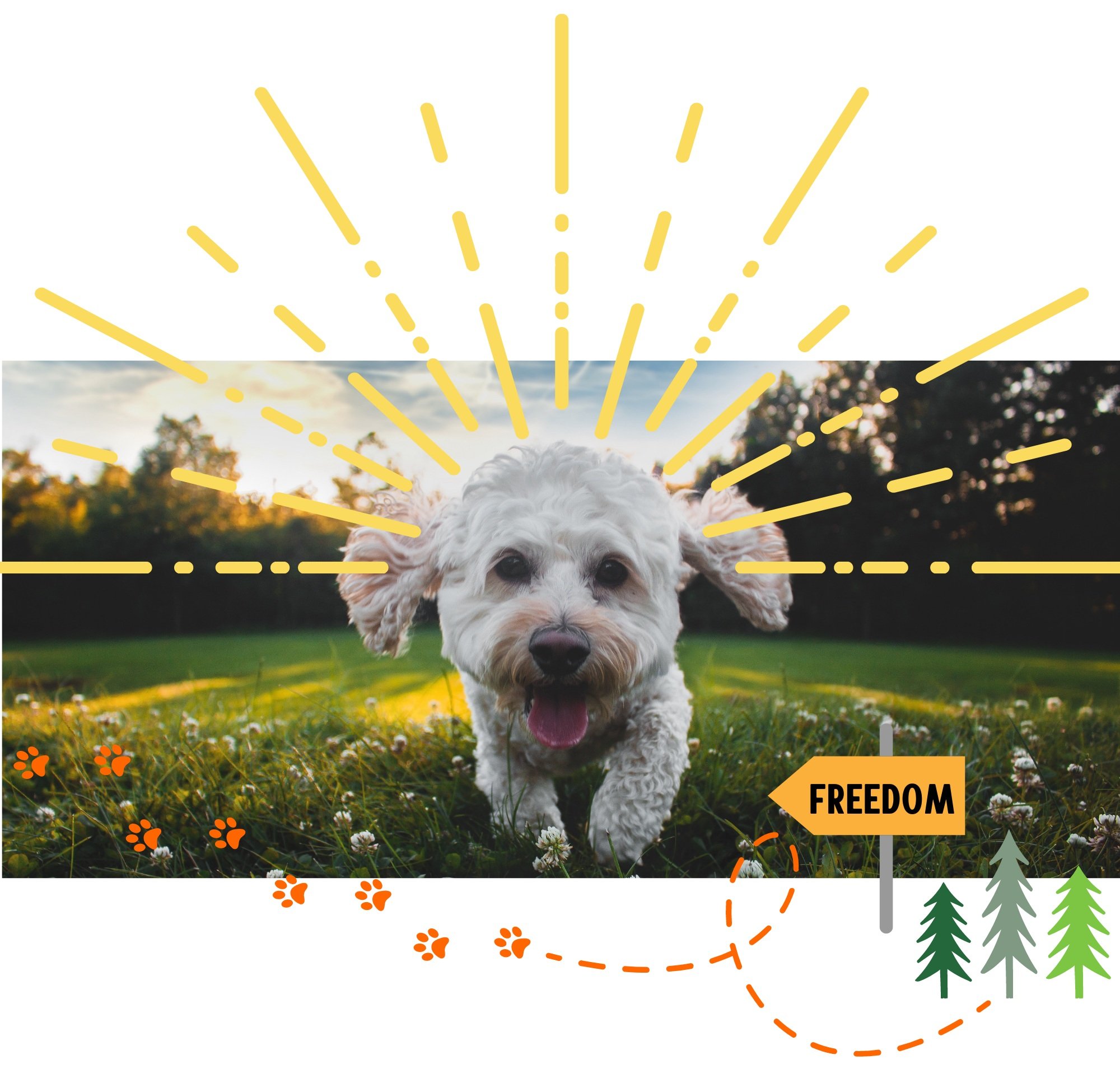Being 100% responsible for a dog with behavioural issues means everything is so serious all the time. You do everything you can to keep your dog and those around you safe, keep them calm and avoid the things that will send them into meltdown. This means you miss out on the things you see other people doing with their dogs. Never more so than in summertime when everyone else is enjoying off lead walks at the beach, taking their dog on holidays and going for long days out.
Needless to say, you reach the stage where you realise you’re not living the life you imagined with your dog and you may feel trapped, isolated and alone. Their problems take over your life and if you feel anything like I did, you're probably sick of being fed up and miserable, always worrying about your dog, always on the lookout.
It’s exhausting.
What I wanted most was freedom. Freedom for me, and freedom for my reactive rescue dog Lao.
What I learned from Lao and the thousands of reactive and easily distracted dogs and their families I’ve worked with over the years is that the things that are often lacking – light-heartedness, adventure, fun and community – are actually the things that can transform your dog’s behaviour.
I wholeheartedly believe this fun, playful, totally inclusive experience is what was missing in dog training until now. Reactive and distracted dogs shouldn’t miss out on all the fun – and you shouldn’t either!
Tackling your dog's behavioural problems doesn't always have to be hard work. In fact, you can start seeing results just by having fun.
Why?
Because having fun together helps you connect with your dog and when you have a connected relationship, everything is possible. Your dog will choose to focus on you instead of the many distractions out there and training them not to pull, bark or lunge becomes so much easier. And even more essentially – it makes you feel better, more confident, more peaceful walking your dog.
Here are 4 ways to have better walks with your reactive or easily distracted dog this summer while having fun.
1.Sniffing. Lots of sniffing.
Sniffing helps your dog feel calm. They’ll be having fun and you have calmer walks with more fun:
Sniffing and searching is a natural behaviour for dogs, part of their hard-wired hunting instincts - it keeps them happy and fulfilled!
Over-excitable and/or reactive dogs – scentwork helps dogs relax on walks as they are super-focused on the task in hand. Not only do they become less alert to triggers because they have something else to do, but because that something is sniffing, they are more relaxed.
Scenting is particularly useful for dogs who are hypervigilant and always on the lookout for triggers as it directs their attention to sniffing the ground.
Observing your dog as they search helps you tune into how they communicate - learning to speak your dog’s language allows you to know when they are relaxed and happy - and how to recognise the signals that they are about to go into meltdown mode.
Scentwork is low impact so it’s suitable for all dogs. An excellent focus skill for puppies to learn and can increase longevity in older dogs.
2. Mix it up.
Let’s move away from the idea that a ''Dog Walk'' has to be A to B in X number of minutes or repeatedly throwing a tennis ball because you don't know what else to do.
Try a combination of scent games, adventure and exploration to spice up your walks and keep them fresh and exciting.
No more boring walks! No more not knowing what to do or where to go!
Experimenting with different activities not only makes walks more interesting but it gives them a purpose. You’re no longer just going for a standard dog walk - you and your dog are on an adventure together!
Plus, having an arsenal of activities up your sleeve means you’ll know exactly which one to pull out in any situation where you need to keep your dog calm.
3. Lighten up.
If you find yourself worrying about your dog’s behaviour a lot, or you’ve hit a wall in the training, or you’re getting frustrated with yourself or with your dog, it may feel like things have gotten a bit heavy recently and no matter how hard you try, you’re not getting anywhere.
It may seem counterintuitive but sometimes the best way to make progress is to stop trying so hard. Instead of pushing for results in training, focus on building the bond and relationship you have with your dog. You may be surprised at how things just seem to click when you do.
4. Join a community.
Gather a support network you can count on. Family and friends may not always understand the pressures of caring for a reactive dog so choose a network of people who get it.
Belonging to a group of likeminded people going through the same thing as you means you never feel alone. You’ll get accountability to make you more likely to stay on track, and feedback to help you make faster progress.
It’s also a great way to socialise with other people who have dogs with similar issues to yours, and it provides an understanding space to vent on the bad days and celebrate the wins on the good days.
I’m looking forward to hearing how sniffing, variety, lightening up and joining a community transform your walks this summer.
If you’d like any help getting started, our brand new summer fun programme launches today.
The specialist programme blends training and behaviour improvement techniques with scentwork and adventure – so you can enjoy relaxing, fulfilling walks with your best friend. And it’s totally inclusive – everyone can take part and feel that they belong, no matter what their dog’s issues may be.





